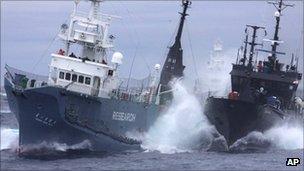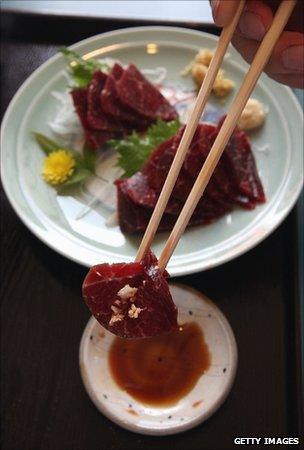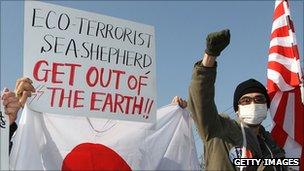Japan's decision day on whaling
- Published
- comments

A resumption of the annual clashes in the Southern Ocean now looks inevitable
Would they commit, or wouldn't they?
The Japanese government has delayed its decision on the future of its Antarctic whaling programme longer than a commitment-phobic fiance.
But now Fisheries Minister Michihiko Kano has formally announced that the fleet will sail again to the Southern Ocean later this year, and the hostilities from opponents such as Australia have started again.
There's a highly credible theory out there that significant portions of the government and the bureaucracy were keen to exit the annual hunt; but not at any price.
Negotiators from anti-whaling countries who were involved in the recent two-year attempt to build a compromise between Japan and its opponents certainly believed Japan was sincere, and was looking for an exit strategy.
That process finally foundered at last year's International Whaling Commission (IWC), external meeting in Morocco, with some anti-whaling countries demanding a complete and immediate halt to the annual Southern Ocean hunt, which Japan would not offer.
Then came the fiasco of a whaling season earlier this year, when a fleet pared down by budgetary constraints found itself for the first time out-gunned and out-paced by the Sea Shepherd Conservation Society, and left the hunting grounds early with its tail between its legs.

Whalemeat is no longer the staple food in Japan that it was during World War II
After the Tokoku earthquake in March, a lot of soul searching went on in Tokyo's corridors of power on a huge number of issues.
The Fisheries Ministry took the radical step of setting up an expert committee, external, largely drawn from acadaemia, to discuss whether Antarctic whaling was still in the national interest and to make recommendations accordingly.
The panel was split, with a majority coming down in favour of continuing but a minority convinced that the Antarctic whaling era should finally close.
Then came the political considerations.
Whaling is important in a few key constituencies, both geographical and factional; and with the government in deep trouble over its handling of the post-earthquake, post-tsunami and post-Fukushima clean-up, party politics always appeared likely to decide the whaling future.
In reputational terms, the government was in a difficult position.
Pulling out would have been portrayed as surrender to Sea Shepherd. Continuing was to risk undermining some of the huge Western support and sympathy engendered by the earthquake and tsunami damage.
And a middle way - a cheaper, slimmed-down hunt with a small fleet and a small catch quota - was not an option, because Sea Shepherd made clear it would be back, and would presumably have claimed an easier victory.
So it really was an either/or moment.
The presumption is that officials will now despatch a beefed-up fleet later this year.
Mr Kano said the fleet's capacity to resist Sea Shepherd will be enhanced with "escort ships", although a Fisheries Agency official told me the composition of the fleet, the number of boats and the nature of these protection vessels were "confidential".
The other question mark concerns the factory ship Nisshin Maru.
From August this year, new International Maritime Organisation (IMO) rules, external mean ships cannot enter Antarctic waters carrying heavy fuel oil, which the Nisshin Maru has previously used.
Japanese officials have repeatedly stressed that they will adhere to the regulations. So presumably the ship will be adapted to run on diesel, which is considerably more expensive.
While Sea Shepherd plans a return to direct action, external, the Australian government is pressing ahead with its legal challenge through the International Court of Justice, external.

Some maintain that Sea Shepherd's campaign has built support for whaling in Japan
Its "Memorial" - the case for the prosecution, in other words - has been lodged, and Japanese officials are now compiling their response.
Whatever happens, the case is likely to drag on for years - possibly as few as three, but who knows?
Environment and animal welfare groups are also emerging to condemn the decision to continue the hunt.
But for some, this might also be an opportune time for reflection.
At the IWC meeting in Morocco, there was a real chance of emerging with an agreement under which Japan would have pledged to cut its Antarctic catch of minke whales to a few hundred per year now and 150 per year in 2015.
That would almost certainly have led to a complete cessation within a decade.
Under intense pressure from campaigners, some members of the anti-whaling bloc (in particular the Latin Americans) walked away.
In doing so, they gambled that a combination of public pressure, budgetary concerns and a declining whalemeat market would end the hunt.
The other side of the coin was that Japan might respond exactly as it has now done.
Rather than a few hundred minkes, the fleet is this year aiming for the full 850 specified in the Japanese Whale Research Program under Special Permit in the Antarctic (Jarpa-2), external.
Talk of cessation is off the table; and on both side, the harpoons are being sharpened again.
Follow Richard on Twitter, external